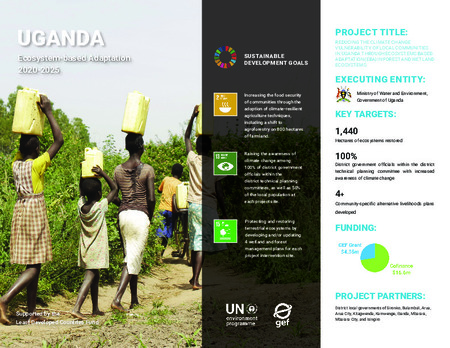| dc.contributor | Ecosystems Division | en_US |
| dc.contributor.author | United Nations Environment Programme | en_US |
| dc.coverage.spatial | Uganda | en_US |
| dc.date.accessioned | 2023-09-25T14:09:41Z | |
| dc.date.available | 2023-09-25T14:09:41Z | |
| dc.date.issued | 2023-09 | |
| dc.identifier.uri | https://wedocs.unep.org/20.500.11822/43529 | |
| dc.description | Uganda is a landlocked country in East Africa with a population of around 48 million that is currently expanding at around 3.2% per year. Natural ecosystems, such as forests and wetlands contribute considerably to livelihoods and the economy in Uganda. Forests contribute ~6% of the country’s GDP, while natural resources from wetlands provide $432 per year on average to each Ugandan household. A project is aiming to increase the climate resilience of communities in Uganda through ecosystem-based adaptation (EbA), an approach of using nature and healthy ecosystems as part of an overall adaptation strategy to reduce the impacts of climate change on people. In addition to restoring damaged ecosystems, the project is promoting alternative climate resilient livelihoods to reduce pressure on nature and biodiversity. | en_US |
| dc.description.uri | https://www.unep.org/explore-topics/climate-action/what-we-do/climate-adaptation/ecosystem-based-adaptation | en_US |
| dc.format | pdf | en_US |
| dc.language | English | en_US |
| dc.rights | Public | en_US |
| dc.title | Uganda: Ecosystem-based Adaptation 2020-2024 | en_US |
| wd.identifier.sdg | SDG 13 - Climate Action | en_US |
| wd.topics | Climate Action | en_US |
| wd.identifier.pagesnumber | 2 p. | en_US |


